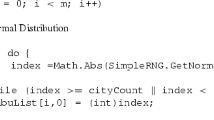Abstract
Single-machine weighted earliness tardiness scheduling is a prevalent problem in just-in-time production environments. Yet, the case with distinct due dates is strongly NP-hard. Herein, it is approximately solved using ASV, an ant colony-based system with a reduced number of ants and of colonies and with daemon actions that explore the search space around the ants using a variable neighborhood search (VNS). The numerical investigation provides computational proof of the utility of the daemon actions. In addition, it infers that these latter can be applied either to the initial or to subsequent colonies. Furthermore, it highlights the importance of using ant colony optimization as the multiple restart engine of VNS. Finally, it shows that ASV obtains the optimum for most small-sized instances. It has a 0.2 % average deviation from the optimum over all benchmark instances.









Similar content being viewed by others
References
Behnamian, J., Fatemi Ghomi, S. M. T., & Zandieh, M. (2010). Development of a hybrid meta heuristic to minimise earliness and tardiness in a hybrid flow shop with sequence-dependent setup times. International Journal of Production Research, 48(5), 1415–1438.
Blum, C. (2005). Beam-ACO-hybridizing ant colony optimization with beam search: An application to open shop scheduling. Computers & Operations Research, 32, 1565–1591.
Bulbul, K., & Kaminsky, P. (2013). A linear programming-based method for job shop scheduling. Journal of Scheduling, 16(2), 161–183.
Gagné, C., Price, W. L., & Gravel, M. (2002). Comparing an ACO algorithm with other heuristics for the single machine scheduling problem with sequence-dependent setup times. Journal of the Operational Research Society, 53, 895–906.
Holthaus, O., & Rajendran, C. (2005). A fast ant-colony algorithm for single-machine scheduling to minimize the sum of weighted tardiness of jobs. Journal of the Operational Research Society, 56, 947–953.
Huang, K. L., & Liao, C. J. (2008). Ant colony optimization combined with taboo search for the job shop scheduling problem. Computers & Operations Research, 35, 1030–1046.
Kim, Y., Lim, H. G., & Park, M. W. (1996). Search heuristics for a flow shop scheduling problem in a printed circuit board assembly process. European Journal of Operational Research, 91(1), 124–143.
Li, H., & Zhang, H. (2013). Ant colony optimization-based multi-mode scheduling under renewable and nonrenewable resource constraints. Automation in Construction, 35, 431–438.
Liaw, C. F. (1999). A branch and bound algorithm for the single machine earliness and tardiness scheduling problem. Computers & Operations Research, 26, 679–693.
Lo, S. T., Chen, R. M., Huang, Y. M., & Wu, C. L. (2008). Multiprocessor system scheduling with precedence and resource constraints using an enhanced ant colony system. Expert Systems with Applications, 34(3), 2071–2081.
Marimuthu, S., Ponnambalam, S. G., & Jawahar, N. (2009). Threshold accepting and ant-colony optimization algorithms for scheduling m-machine flow shops with lot streaming. Journal of Materials Processing Technology, 209, 1026–1041.
M’Hallah, R. (2007). Minimizing total earliness and tardiness on a single machine using a hybrid heuristic. Computers & Operations Research, 34(10), 3126–3142.
M’Hallah, R. (2014). An iterated local search variable neighborhood descent hybrid heuristic for the total earliness tardiness permutation flow shop. International Journal of Production Research, 52(13), 3802–3819.
M’Hallah, R., & Alhajraf, A. (2008). Ant colony optimization for the single machine total earliness tardiness scheduling problem. Lecture Notes in Computer Science, 5027, 397–407.
M’Hallah, R., & Alkhabbaz, A. (2013). Scheduling of nurses: A case study of a Kuwaiti health care unit. Operational Research for Health Care, 2(1–2), 1–19.
M’Hallah, R., & Al-Roomi, A. (2014). The planning and scheduling of operating rooms: A simulation based approach. Computers & Industrial Engineering, 78, 235–248.
Muller-Hannemann, M., & Sonnikow, A. (2009). Non-approximability of just-in-time scheduling. Journal of Scheduling, 12(5), 555–562.
Parthasarathy, S., & Rajendran, C. (1997). A simulated annealing heuristic for scheduling to minimize mean weighted tardiness in a flow shop with sequence-dependent setup times of jobs–A case study. Production Planning and Control, 8(5), 475–483.
Rocha de Paula, M., Ravetti, M. G., Mateus, G. R., & Pardalos, P. M. (2007). Solving parallel machines scheduling problems with sequence-dependent setup times using variable neighbourhood search. IMA Journal of Management Mathematics, 18(2), 101–115.
Schaller, J., & Valente, J. (2013). A comparison of metaheuristic procedures to schedule jobs in a permutation flow shop to minimise total earliness and tardiness. International Journal of Production Research, 51(3), 772–779.
Tanaka, S., & Fujikuma, S. (2012). A dynamic-programming-based exact algorithm for general single-machine scheduling with machine idle time. Journal of Scheduling, 15(3), 347–361.
Tanaka, S., Fujikuma, S., & Araki, M. (2009). An exact algorithm for single-machine scheduling without machine idle time. Journal of Scheduling, 12, 575–593.
Tasgetiren, M. F., Liang, Y., Sevkli, M., & Gencyilmaz, G. (2007). A particle swarm optimization algorithm for makespan and total flowtime minimization in the permutation flowshop sequencing problem. European Journal of Operational Research, 177, 1930–1947.
Tavares Neto, R. F., & Godinho, Filho M. (2013). Literature review regarding ant colony optimization applied to scheduling problems: Guidelines for implementation and directions for future research. Engineering Applications of Artificial Intelligence, 26, 150–161.
Wan, L., & Yuan, J. (2013). Single-machine scheduling to minimize the total earliness and tardiness is strongly NP-hard. Operations Research Letters, 41, 363–365.
Zegordi, S. H., Itoh, K., & Enkawa, T. (1995). A knowledgeable simulated annealing scheme for the early/tardy flow shop scheduling problem. International Journal of Production Research, 33(5), 1449–1466.
Author information
Authors and Affiliations
Corresponding author
Rights and permissions
About this article
Cite this article
M’Hallah, R., Alhajraf, A. Ant colony systems for the single-machine total weighted earliness tardiness scheduling problem. J Sched 19, 191–205 (2016). https://doi.org/10.1007/s10951-015-0429-x
Published:
Issue Date:
DOI: https://doi.org/10.1007/s10951-015-0429-x




